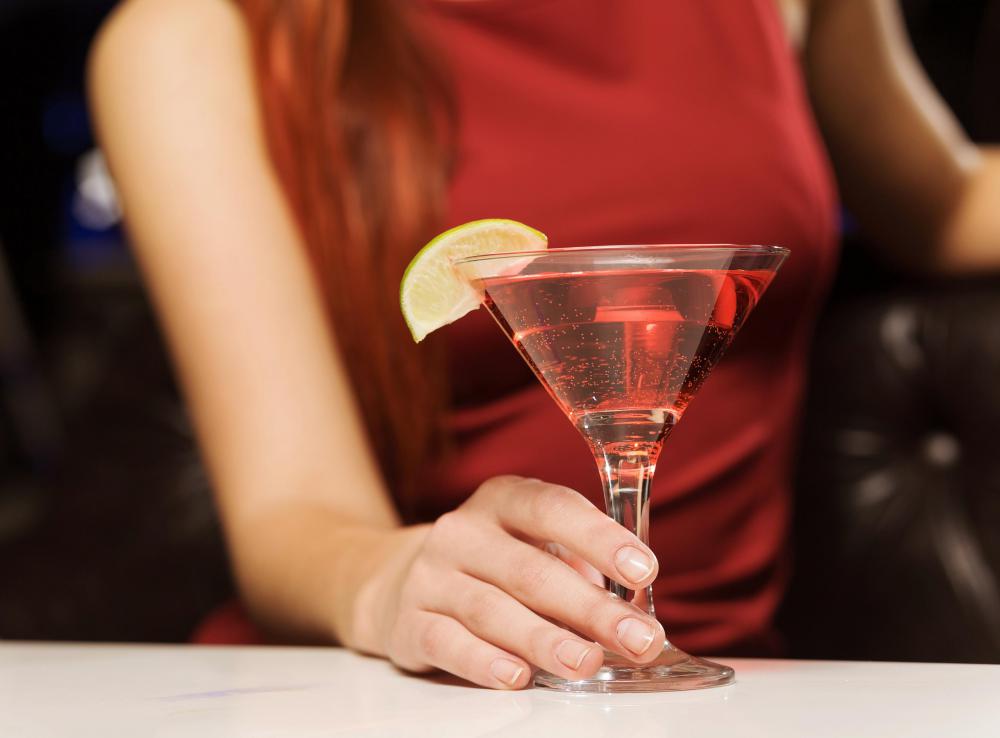At WiseGEEK, we're committed to delivering accurate, trustworthy information. Our expert-authored content is rigorously fact-checked and sourced from credible authorities. Discover how we uphold the highest standards in providing you with reliable knowledge.
What Is the Relationship between Alcohol and Ketosis?
Ketosis is a condition where acidic compounds called ketone bodies circulate in the human body. A link between alcohol and ketosis shows that alcohol can speed the formation of ketone bodies. Very intoxicated individuals as well as chronic alcoholics can develop ketosis, especially if they are not eating well. In people using low carbohydrate diets for weight loss, alcohol intake may need to be moderated for the best results, because the body will burn the alcohol for fuel before turning to fat.
In people eating a mixed diet, the body breaks down carbohydrates for energy, creating glucose to send to the cells. When carbohydrates are not available because of a special diet or severe calorie restriction, the body starts burning its own fat for fuel. This creates a state known as ketosis, which can become dangerous if too many ketone bodies enter circulation. They can cause a condition known as acidosis, where the pH in the blood is out of balance.

The link between alcohol and ketosis is a result of the fact that alcohol breaks down readily into ketones as well as the intoxicating acetaldehyde in the liver. Alcoholics and people who are severely intoxicated with minimal food in their stomachs can develop ketosis. These individuals don’t have enough food, especially carbohydrates, to balance out the alcohol. They can progress to acidosis because of the large number of ketones in the blood.

This can also be an issue for diabetic patients, who need to be aware of the link between alcohol and ketosis because they could get seriously ill if they don’t moderate alcohol intake. This is a particular concern if the patient hasn’t eaten recently. Likewise, people on starvation diets can be at risk because of the connection between alcohol and ketosis, which can make them intoxicated more quickly when they drink, and can elevate ketone levels in the blood very quickly.

Low carbohydrate diets are touted as one way to lose weight by deliberately forcing the body into ketosis with dietary choices. Left with limited carbohydrates to use for energy, the body turns to its own fat as a source of fuel. Drinking while on such a diet can slow weight loss, because the liver processes the alcohol before the fat. Considering alcohol and ketosis is important for people on weight loss plans who want to lose weight efficiently and safely. They may want to consult a medical professional or nutritionist to get advice on a suitable weight loss plan.
Understanding the relationship between alcohol and ketosis is crucial for those following a keto diet. Alcohol can disrupt the metabolic state of ketosis, slowing down weight loss and potentially impacting health goals. For individuals committed to maintaining a ketogenic lifestyle, moderation is key, and choosing lower-carb alcoholic options may minimize interference with ketosis. To navigate these challenges and make informed choices, utilizing resources like a keto diet app can provide guidance on how to enjoy alcohol responsibly without derailing one's diet, ensuring that the delicate balance of ketosis is maintained.
AS FEATURED ON:
AS FEATURED ON:













Discussion Comments
I'm not sure if alcohol causes ketosis for me or if I'm already in ketosis and the alcohol makes it worse. But I've noticed that sometimes when I drink, I get drunk much more quickly and have a very long hangover afterward.
I guess my question is, how do I know if I'm in ketosis or not? I think diabetics have a way to check for this right? If I knew when I'm in ketosis, I could avoid alcohol until I've recovered.
@ankara-- Your glass of wine could cause ketosis while on a low-carb diet. Alcohol is high in calories, so if you're on a diet, can't you just avoid alcohol?
I'm on a low-carb diet because of Celiac disease and I have had issues with alcohol. Alcohol makes me dizzy and generally unwell and I know that these are symptoms of ketosis.
The issue is not just that alcohol causes and aggravates ketosis, but it also causes low blood sugar. This is why I'm avoiding alcohol.
I started a low carb diet recently. Do I need to avoid alcohol now? I don't drink a lot, just a glass of wine once or twice a week. Will this cause ketosis?
Post your comments